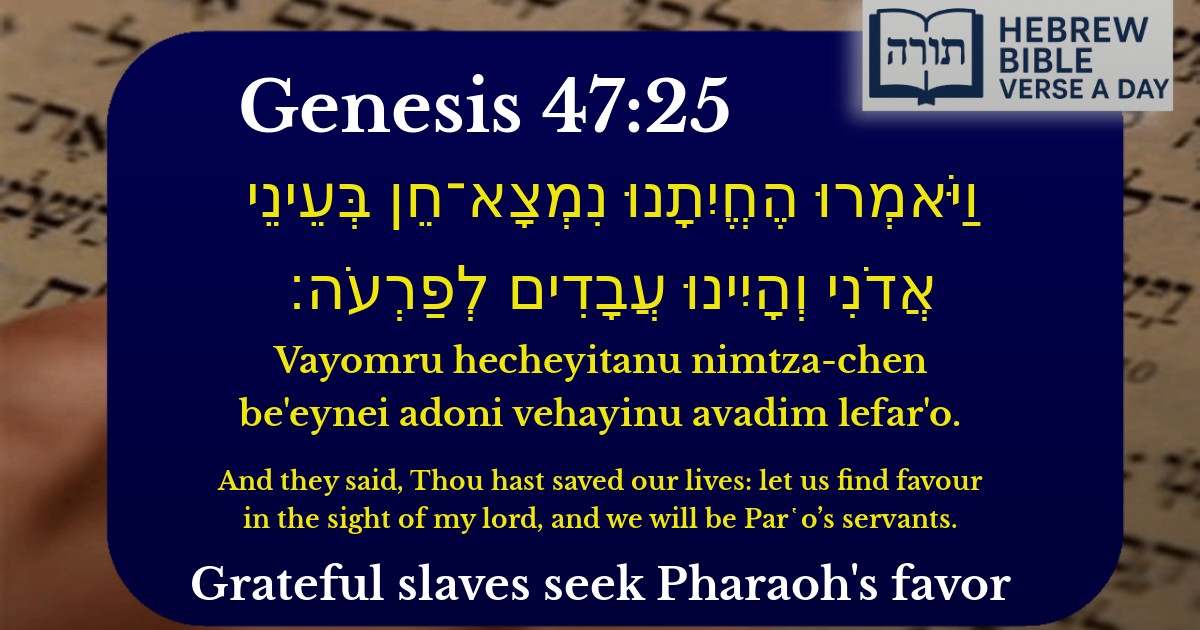Join Our Newsletter To Be Informed When New Videos Are Posted
Join the thousands of fellow Studends who rely on our videos to learn how to read the bible in Hebrew for free!
Hebrew Text
וַיֹּאמְרוּ הֶחֱיִתָנוּ נִמְצָא־חֵן בְּעֵינֵי אֲדֹנִי וְהָיִינוּ עֲבָדִים לְפַרְעֹה׃
English Translation
And they said, Thou hast saved our lives: let us find favour in the sight of my lord, and we will be Par῾o’s servants.
Transliteration
Vayomru hecheyitanu nimtza-chen be'eynei adoni vehayinu avadim lefar'o.
Hebrew Leining Text
וַיֹּאמְר֖וּ הֶחֱיִתָ֑נוּ נִמְצָא־חֵן֙ בְּעֵינֵ֣י אֲדֹנִ֔י וְהָיִ֥ינוּ עֲבָדִ֖ים לְפַרְעֹֽה׃
וַיֹּאמְר֖וּ הֶחֱיִתָ֑נוּ נִמְצָא־חֵן֙ בְּעֵינֵ֣י אֲדֹנִ֔י וְהָיִ֥ינוּ עֲבָדִ֖ים לְפַרְעֹֽה׃
🎵 Listen to leining
Parasha Commentary
📚 Talmud Citations
This verse is not quoted in the Talmud.


Context of the Verse
This verse (Bereshit 47:25) appears in the narrative of Yosef's governance over Egypt during the years of famine. After Yosef implements his economic policies—acquiring all of Egypt's land and people for Pharaoh in exchange for food—the people express gratitude for their survival and offer themselves as servants to Pharaoh.
Rashi's Explanation
Rashi (Rabbi Shlomo Yitzchaki) comments that the phrase "הֶחֱיִתָנוּ" (Thou hast saved our lives) reflects the people's acknowledgment that Yosef's wisdom and leadership preserved them from starvation. Rashi emphasizes that their declaration of loyalty to Pharaoh was a direct result of Yosef's policies, which ensured their survival.
Rambam's Perspective
The Rambam (Maimonides) in Hilchot Melachim (Laws of Kings) discusses the ethical implications of servitude and governance. While this verse describes voluntary servitude, Rambam would view it as a temporary measure under extreme circumstances (famine), not an ideal or permanent state. The people's willingness to become Pharaoh's servants was a pragmatic response to Yosef's lifesaving policies.
Midrashic Interpretation
The Midrash (Bereshit Rabbah 90:5) elaborates that the people's statement "נִמְצָא־חֵן בְּעֵינֵי אֲדֹנִי" (let us find favour in the sight of my lord) reflects their recognition of Yosef's righteousness. Despite their reduced status, they sought to maintain a relationship of mutual respect, acknowledging Yosef as a conduit of divine providence.
Halachic Implications
Moral Lesson
The Netziv (Rabbi Naftali Tzvi Yehuda Berlin) in Ha'amek Davar notes that this episode teaches the importance of humility and gratitude in times of crisis. The Egyptians, though subjugated, recognized Yosef's benevolence and responded with loyalty, setting an example of how one should respond to kindness—even from a position of dependency.